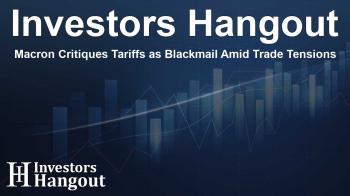Macron Critiques Tariffs as Blackmail Amid Trade Tensions

Macron's Critique on Tariffs
French President Emmanuel Macron has expressed strong disapproval of powerful nations utilizing tariffs as tactics of "blackmail." His comments reflect deep concerns as the ongoing negotiations between the European Union and the United States approach a critical juncture.
Key Remarks at International Conference
At the International Conference on Financing for Development, Macron characterized trade conflicts as detrimental, describing them as an "aberration." While refraining from directly criticizing President Trump, he highlighted that the current trade approach needs reevaluation to prioritize equity over dominance.
EU's Position on Tariffs
Macron emphasized the need for fairness in international commerce, advocating for practices that do not exploit economic power. He stated, "we need to restore freedom and equity to international trade, much more than barriers and tariffs, which are devised by the strongest." Such statements underscore the EU’s readiness to confront unfair trade practices.
White House's Response
In response to Macron's comments, White House Press Secretary Karoline Leavitt defended the tariff measures as crucial for revitalizing U.S. manufacturing. Leavitt reiterated that President Trump is committed to acting in the best interest of the United States and its workforce.
Impacts on Markets and Trade
The ongoing tariff disputes have significant ramifications for European markets. For instance, previous threats of stringent tariffs led to notable market fluctuations. When tariffs were hinted at, the Euro STOXX 50 index experienced a downturn of 3%, further highlighting the volatility caused by these trade tensions.
Importance of the Negotiations
The looming deadline for a trade agreement adds urgency to the negotiations. If an agreement is not reached, the repercussions could be severe, with potential tariffs reaching as high as 50% on a broad array of EU goods.
Investment Considerations
Major companies and investors are closely monitoring developments. Firms like Apple Inc. (NASDAQ: AAPL), SAP SE (NYSE: SAP), and others, which rely heavily on European sales, stand to be affected by the outcomes of these ongoing trade talks. Furthermore, European tech ETFs, including the iShares Europe ETF (NYSE: IEV) and Vanguard FTSE Europe ETF (NYSE: VGK), remain susceptible to the fluctuations that result from these trade negotiations.
Future Implications of Tariffs
Macron's stance against tariffs is not merely rhetorical; it reflects a broader concern about global trade dynamics and its impact on less developed nations. His remarks highlight the challenges faced by countries starting their economic ascensions, which could be hindered by excessive tariffs.
EU's Strategic Responses
The EU is contemplating a significant retaliatory package aimed at U.S. digital services, mirroring past countermeasures. The stakes are high for major U.S. tech firms, like Alphabet Inc. (NASDAQ: GOOGL) and Microsoft Corp. (NASDAQ: MSFT), who could face increased regulatory scrutiny amid rising tensions.
High-Stakes Negotiation Environment
As the deadline approaches, both the U.S. and EU show readiness to negotiate. However, they remain firm in their positions, prompting a high-stakes diplomatic climate. The outcome of these negotiations will likely have lasting impacts on trade relations between the two entities.
Frequently Asked Questions
What is Macron's main criticism of tariffs?
Macron criticizes tariffs as instruments of blackmail, emphasizing the need for fairness and equity in international trade.
What response did the White House have to Macron's comments?
The White House defended the tariffs, stating they are essential for rebuilding U.S. manufacturing and ensuring national interests are met.
How could the ongoing trade disputes impact European markets?
Trade disputes have already caused market volatility, with potential for drastic decreases in stock values, particularly among major exporters.
Which companies are most affected by these trade negotiations?
Major companies, especially those reliant on European markets like Apple and SAP, are particularly vulnerable to the outcomes of the trade negotiations.
What are the possible consequences if no trade deal is reached?
If no deal is reached, EU goods could face tariffs up to 50%, which may severely disrupt trade and economic balance.
About The Author
Contact Henry Turner privately here. Or send an email with ATTN: Henry Turner as the subject to contact@investorshangout.com.
About Investors Hangout
Investors Hangout is a leading online stock forum for financial discussion and learning, offering a wide range of free tools and resources. It draws in traders of all levels, who exchange market knowledge, investigate trading tactics, and keep an eye on industry developments in real time. Featuring financial articles, stock message boards, quotes, charts, company profiles, and live news updates. Through cooperative learning and a wealth of informational resources, it helps users from novices creating their first portfolios to experts honing their techniques. Join Investors Hangout today: https://investorshangout.com/
The content of this article is based on factual, publicly available information and does not represent legal, financial, or investment advice. Investors Hangout does not offer financial advice, and the author is not a licensed financial advisor. Consult a qualified advisor before making any financial or investment decisions based on this article. This article should not be considered advice to purchase, sell, or hold any securities or other investments. If any of the material provided here is inaccurate, please contact us for corrections.

